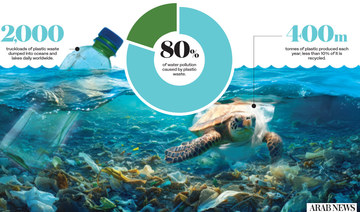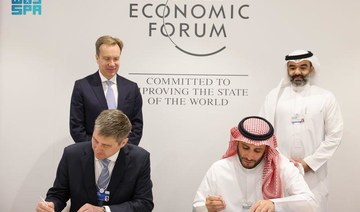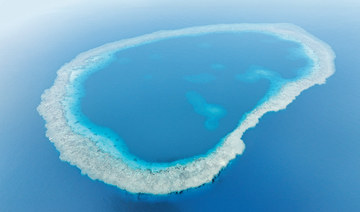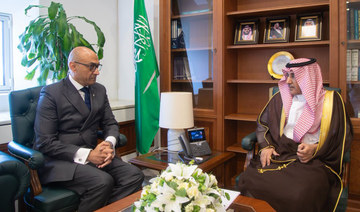Saudi Arabia has unveiled a new vision for agriculture through collaboration, which aims to deliver food security, environmental sustainability and economic opportunity.
This new vision, which stresses the need to produce more food with fewer resources and reinvigorating rural economies, was unveiled by Agriculture Minister Fahd Balghunaim to coincide with National Day celebrations..
Balghonaim, who gave an overview of the agricultural production in the Kingdom, called on leaders of business, farmers and development partners “to work together” to achieve sustainable agricultural growth.
“Saudi Arabia would like to be an effective element in increasing agricultural productivity,” said the minister, while asserting that the Kingdom would like to be an effective element in the world to increase agrarian production by improving agricultural productivity at the domestic front.
He maintained that “there are many alternatives to fulfill the domestic requirement and the ministry is working out several plans to cover the market demand.”
The minister, however, expressed concern that the Kingdom so far had not achieved self-sufficiency in poultry and vegetable segment.
“What has been achieved is only sufficiency in eggs supplies,” he said.
Saudi Arabia produces 42 percent of domestic poultry consumption and 85 percent of the vegetables consumption, Balghonaim said.
He said: “There is no shortage in vegetables, despite the political issues in Syria as we have almost achieved self-sufficiency in this field and for remaining 15 percent of the market demand, there are many alternatives to cover up the requirement.”
He said: “There is a new trend of farming in the greenhouses for the production of larger quantities of vegetables.”
Moreover, we encourage the private sector for investment in agriculture,” he added.
Referring to a shortage for tomatoes the market, he said: “We want Morocco to export tomatoes to the Kingdom to meet the shortfall in the domestic market.”
Saudi Arabia signed two deals worth SR560 million recently to build a wheat silo and a flour mill at Jazan Port to raise its storage capacity to more than three million tons of wheat from around two million tons in two years, enough to cover its annual consumption, according to the minister.
The new Jazan silo will have a capacity of 120,000 tons of wheat.
Balghonaim, who also heads the country’s state-run Grain Silos and Flour Mills Organization (GSFMO), said the second contract was to build a mill with the capacity to process 600 tons of wheat a day.
Both projects will be completed soon.
In October, Waleed El-Khereiji, director general of GSFMO said various projects were already under way to add 710,000 tons of wheat storage capacity.
Saudi Arabia plans to import more wheat this year following an increase in consumption and a planned decrease in local purchases.
The Kingdom abandoned plans for self-sufficiency in wheat in 2008 and aims to be 100 percent reliant on imports by 2016 in order to save water, said Balghonaim, adding that the country has the advantages in terms of financial experience, agricultural management.
Moreover, it maintains good relations with almost all countries to meet its agrarian requirements, the minister said.
Referring to the growth of agriculture sector and its positive impact on economy, he said Saudi Arabia’s agriculture and food sectors are expected to sustain a combined annual growth of 18.5 percent, driven by a rising population and strong consumer spending.
Food sales in the Kingdom account for around half of the domestic retail market and are expected to be worth almost $70 billion by 2016.
According to a report, Saudi Arabia’s food consumption is expected to grow by 4.2 percent between 2011 and 2015, driven by factors such as rising income levels, population growth, lifestyle shifts, and a thriving domestic economy.
The Saudi government has already allocated around $15 billion for the agricultural sector this year for projects and initiatives aimed at meeting demand.
The Saudi government is also encouraging more rapport and collaboration between the public and private sectors to ensure food security in the Kingdom, which ranks as the Middle East’s largest individual food importer and the largest market in the region for agro-food products and technologies.
The Ministry of Agriculture is heavily involved in the agriculture industry as the ministry is primarily responsible for the agricultural policies in the nation.
The private sector has been playing a major role as the Saudi government offers long-term interest free loans, along with low-cost water, fuel, electricity and duty-free imports of raw materials and machinery.
While Saudi Arabia is also the region’s largest food producer, representing 74.1 percent of total production in the GCC, it imports more than $14.2 billion worth of food and beverage products each year to meet its consumption demands.
According to BMI’s recent Q1 2013 report, this will rise to $35.2 billion by 2020.
Analysts also predict the country’s changing dietary pattern from carbohydrate-rich to protein-rich and high-value food products will create new opportunities for food companies in the Kingdom.
In order to address the growing food demands from consumers, the Saudi government plans to inject $22.1 billion into its food security initiative, said the report.
The move is aimed at reducing the country’s dependence on food imports as well as provide employment for up to 46,000 people.
A young and growing population coupled by a thriving domestic economy is changing food consumption habits, creating significant opportunities for importers and exporters. Hence, the Kingdom and its agencies have taken several initiatives to boost agriculture production, including dairy and poultry production.
The state-owned Agricultural Development Fund has launched a seven-point initiative that will change the whole face of Saudi Arabia’s agricultural sector.
The plan is now ready for implementation. It includes establishing agricultural information center, water conservation in irrigation except for wheat and fodder, establishing an entity or more for handling and marketing vegetables and fruit and another for fish, cooperative insurance for livestock sector starting with poultry, dates marketing, and cattle breeding company.
The main objective behind the launch of these initiatives is to keep up with local, regional and international variables in agriculture sector.
He pointed out that the staff in charge conducted a study on the market situation where they understood all viewpoints of related parties to the market and discussed solutions to the problems experienced by the Kingdom markets.
Among recommendations and proposals that will be included in the new initiatives, is creation of markets for farmers.
In fact, the Saudi government has been trying and supporting farmers to be more productive for the last several decades.
The government mobilized substantial financial resources to support the raising of crops and livestock during the 1970s and 1980s.
The main institutions involved were the Ministry of Agriculture and Water, the Saudi Arabian Agricultural Bank (SAAB) and the GSFMO.
SAAB provided interest-free loans to farmers in 1989 — for example, 26.6 percent of loans were for well drilling and casing, 23 percent for agricultural projects, and the balance for the purchase of farm machinery, pumps, and irrigation equipment.
SAAB also provided subsidies for buying other capital inputs.
GSFMO implemented the official procurement program, purchasing locally produced wheat and barley at guaranteed prices for domestic sales and exports.
The procurement price was steadily reduced during the 1980s because of massive overproduction and for budgetary reasons, but it was substantially higher than international prices.
By the late 1980s, the procurement price for wheat, for example, was three times the international price.
On the top of this, agricultural and water authorities provided massive subsidies in the form of low-cost desalinated water, and electric companies were required to supply power at reduced charges. The program prompted a huge response from the private sector, with average annual growth rates well above those programmed.
These growth rates were underpinned by a rapid increase in land brought under cultivation and agricultural production.
Pioneering Saudi farm techniques bear fruit
Pioneering Saudi farm techniques bear fruit

NCWD launches project to evaluate marine species in Arabian Gulf

- Goal behind project is to build baseline for developing integrated management plan for marine environments
- NCWD CEO said project aims to provide basic assessment of the condition of coral reefs
RIYADH: The National Center for Wildlife Development launched on Tuesday a project that aims to assess the state of marine habitats in the Arabian Gulf’s Saudi waters, the Saudi Press Agency reported.
The NCWD said the goal behind the project was to build a baseline for developing an integrated management plan for marine environments, preserving biodiversity and reducing threats.
It will also enhance the sustainability of marine environments in Saudi waters in light of their economic, social and cultural value and their provision of many valuable ecosystem services.
Mohammed Ali Qurban, NCWD’s CEO, said the project aimed to provide a basic assessment of the condition of coral reefs, seagrass meadows, mangrove forests, and associated animals and marine species.
The project will identify natural risks associated with human activities that threaten these coastal ecosystems, and concurrently, find solutions to reduce those threats.
It will also design an effective plan to preserve and rehabilitate these coastal habitats, based on the data provided by the project.
Qurban said Saudi waters in the Gulf cover an area exceeding 27,000 square kilometers and contain very important marine habitats, which support a wide range of marine species.
NCWD’s CEO pointed out that marine systems are exposed to many pressures and require continuous monitoring and the application of an effective plan to preserve and manage them in a sustainable manner.
The data provided by the project constitute an essential factor for conservation and rehabilitation measures and enabling NCWD and other relevant parties to build a management plan to sustain these valuable habitats.
Prince Sultan University hosts panel on space exploration

- Kingdom has already achieved a high-calibre position in space industry, says NASA’s Bill Nelson
RIYADH: Delegations from NASA and the Saudi Space Agency visited Prince Sultan University on Tuesday to engage with students on the future of human missions in space.
A panel session titled “Beyond Earth: Journeys to the Stars,” brought together NASA administrator Bill Nelson and Saudi astronauts Rayannah Barnawi, Ali Al-Ghamdi and Mariam Fardous, to discuss their own experiences in space.
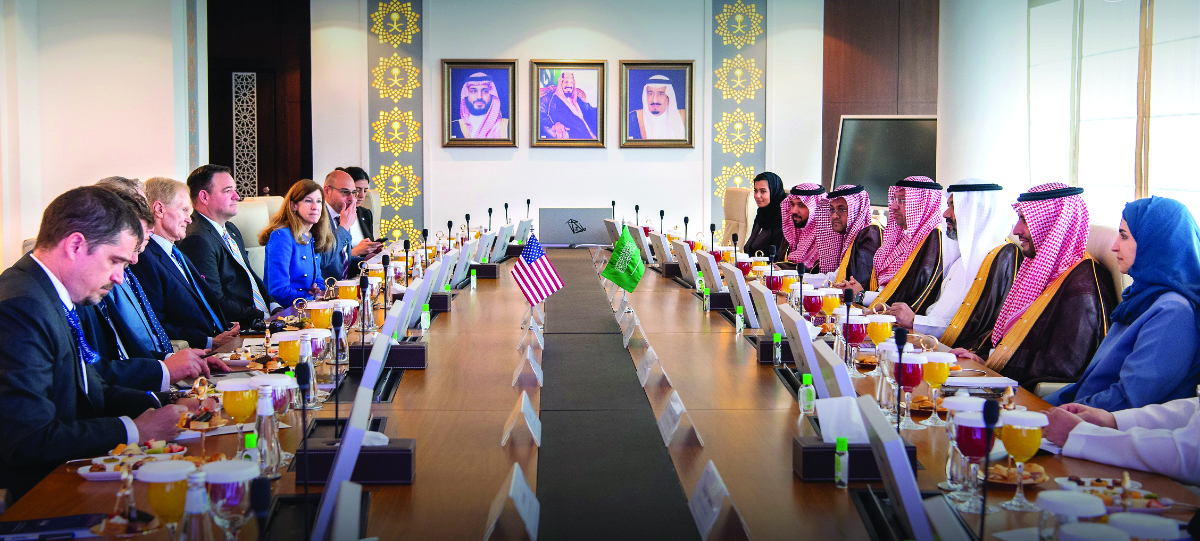
They also debated the future of human missions in space and encouraged the university’s students to be part of the Kingdom’s aspirations in the space field.
Mohammed Al-Tamimi, CEO of Saudi Space Agency, and Ambassador of the US to the Kingdom Michael Ratney, were also present at the reception.
HIGHLIGHTS
• The panel discussion hosted at Prince Sultan University debated the future of human missions in space.
• During his visit to the Kingdom, Bill Nelson also met Munir Eldesouki, president of King Abdulaziz City for Science and Technology.
In an interview with Arab News, Nelson highlighted the importance of space missions. “When we go into space, we have to invent and create new things and that helps us advance our standard of living here on the earth,” he said.
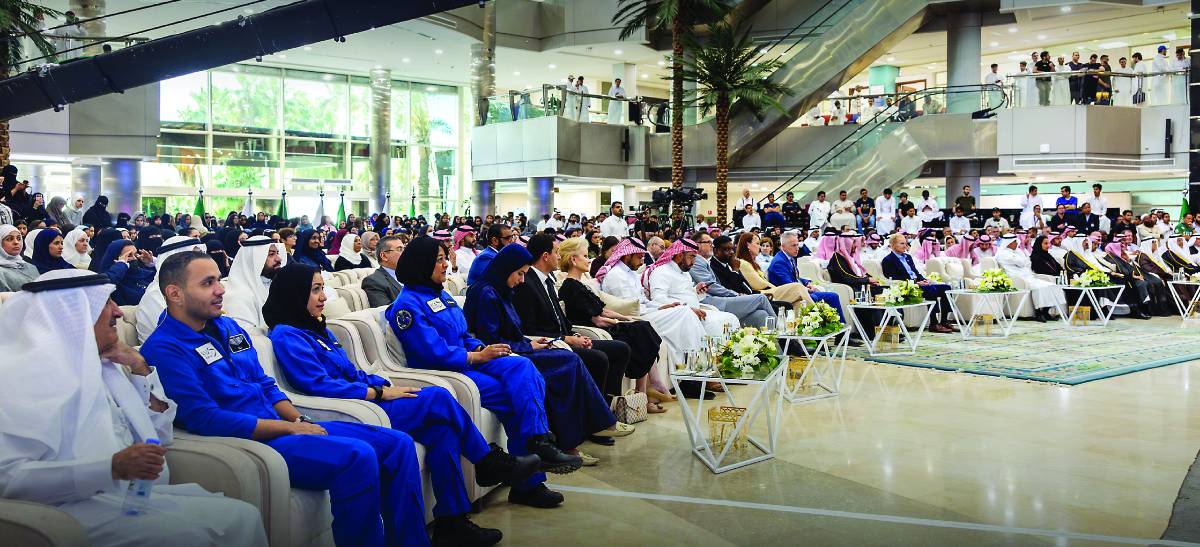
“One of the good examples that I gave in the speech today is the camera in your cell phone, that was developed by NASA. It’s a camera on a chip … there are so many technological outgrowths and spinoffs from our developing space technology.”
Nelson said that there would be further developments in the near future in pharmaceutical research and zero gravity on the International Space Station.
When we go into space, we have to invent and create new things and that helps us advance our standard of living here on the earth.
Bill Nelson, NASA administrator
“There are going to be some major breakthroughs, and already have been on developing drugs, for the cure of diseases. So, there’s a lot of excitement in the future,” he said.
Saudi Arabia has already achieved a high-calibre position in the space industry, he said.
Ahmed Yamani, president of Prince Sultan University, said that it had established a new college of space and aviation with the cooperation with the Saudi Space Agency and Al-Tamimi.
“We went through the process of the initiating this college, which is really based on what we already have … we have a program, aviation management, that was established with Embry-Riddle Aeronautical University in Florida.”
Yamani said that the university was already building the foundation of the space and aviation program with “external consultants that are working with us on both department and both programs. So, we want to definitely touch on the latest and the update updated programs in these areas.”
During his visit to the Kingdom, Nelson also met Munir Eldesouki, president of King Abdulaziz City for Science and Technology, and discussed ways to deepen cooperation in the space sector.
Chairman of the Saudi Space Agency Abdullah Al-Swaha held talks with Nelson in the presence of Al-Tamimi, and they discussed strategic partnership in the field of space to serve humanity.
The Saudi Space Agency is responsible for developing and growing its space sector with a focus on supporting economic growth, stimulating innovation and scientific research.
Saudi Arabia takes part in Netherlands Geospatial World Forum as strategic partner

- The authority is collaborating with the World Bank to conduct studies on the economic impact of geospatial information in Saudi Arabia
RIYADH: Saudi Arabia’s General Authority for Survey and Geospatial Information is serving as a strategic partner in the Geospatial World Forum, a global event with more than 300 speakers specializing in geospatial information.
Themed “Geospatial Transition: Powering the World Economy,” the four-day forum is taking place in Rotterdam, the Netherlands, until May 16.
GEOSA represents the Kingdom at home and abroad in the geospatial sector.

The Rotterdam forum provides a platform to exchange knowledge and unveil smart solutions provided by geospatial information, and includes more than 55 pavilions showcasing the latest technology in the sector.
During the opening session, Mohammed Al-Sayel, president of the authority, said in a speech that geospatial information is playing an important role in decision-making within the rapidly growing Saudi economy.
FASTFACT
Geospatial World Forum held in Rotterdam provides a platform to exchange knowledge and unveil smart solutions provided by geospatial information.
The authority is collaborating with the World Bank to conduct studies on the economic impact of geospatial information in the Kingdom, he added, highlighting work with international organizations concerned with geospatial information management specifications, standards and governance.

Al-Sayel said that the Kingdom, represented by GEOSA, has contributed to the development of geospatial information management globally by hosting the UN Global Geospatial Ecosystem Center of Excellence in Riyadh. The center allows experts to exchange expertise and knowledge within the geospatial information management sphere.
The Kingdom has built and maintained national geospatial infrastructure according to the best international practices, he added, in addition to working on developing national capabilities in the sector.
During a session titled “Geospatial Transition Driving Economic Value in Various Sectors,” GEOSA spokesperson Fatma Al-Shammari said that the Kingdom is undergoing a “significant transition” in various developmental fields, with major projects benefiting from advanced geospatial technologies to achieve national targets.
On the sidelines of the forum, the Kingdom, represented by GEOSA, took part in an accompanying exhibition with its main pavilion as a strategic partner, showcasing Saudi Arabia’s national geospatial infrastructure to visitors and introducing the most prominent development projects in the country.
The exhibition covered hydrographic surveying, national geodetic infrastructure and map production.
Exercise to deal with environmental emergencies starts in Tabuk region
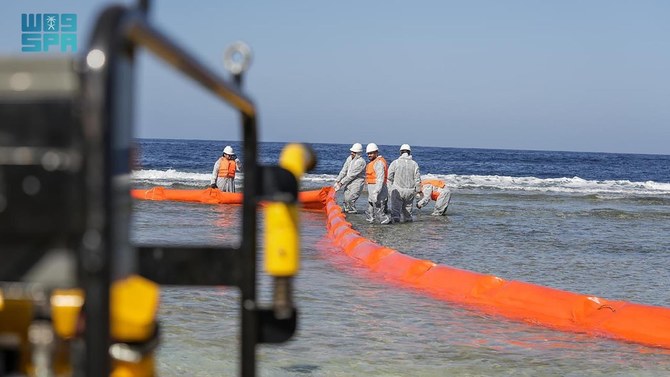
- Exercise is being supervised by the National Center for Environmental Compliance and is taking place in cooperation with 39 governmental and private agencies
RIYADH: An exercise aimed at raising readiness to confront environmental emergencies or oil spill incidents kicked off on the Tabuk coast on Tuesday.
The two-day exercise, called “Response 14,” is part of the Kingdom’s plan to combat pollution of the marine environment with oil and other harmful substances, Saudi Press Agency reported.
The exercise is being supervised by the National Center for Environmental Compliance and is taking place in cooperation with 39 governmental and private agencies.
The center’s official spokesman, Saad Al-Matrafi, revealed that the readiness of each participating agency increased every time such an exercise was held.
He added that there was a noticeable development in the technology being used by the various participating agencies as well as the skills of their employees, as a result of such exercises.
He explained that the exercise is being carried out in several stages in which satellites and advanced simulation programs are used.
Participants will learn how to deal with simulated scenarios of pollution spreading in the middle of territorial waters and its impact extending to coasts and marine habitats.
They will also learn how to contain this pollution and reduce its negative effects on the marine environment and the region’s economy.
Al-Matrafi said the national plan to combat oil spills and harmful substances has succeeded in testing its ability to contain a spill of 75,000 barrels, with a high response rate not exceeding 50 minutes, through the largest fleet of naval units designated for this purpose, in addition to specialist aircraft.
Saudi deputy minister takes part in Arab ministerial meeting on Somalia

- During the meeting, the group discussed the importance of strengthening Arab coordination on issues of common interest, and the importance of respecting the sovereignty of states
MANAMA: Saudi Arabia’s Deputy Minister for International Multilateral Affairs Abdulrahman Al-Rassi on Tuesday participated in the ministerial working group’s meeting in Manama, Bahrain, about supporting Somalia in confronting attacks on its sovereignty and territorial integrity.
During the meeting, the group discussed the importance of strengthening Arab coordination on issues of common interest, and the importance of respecting the sovereignty of states in accordance with international laws and norms, the foreign ministry said in a report.
The meeting was attended by Saudi Arabia’s Permanent Representative to the Arab League Abdulaziz Al-Matar and the director general of the deputy minister’s office, Mohammed Al-Shehri, among other officials.






